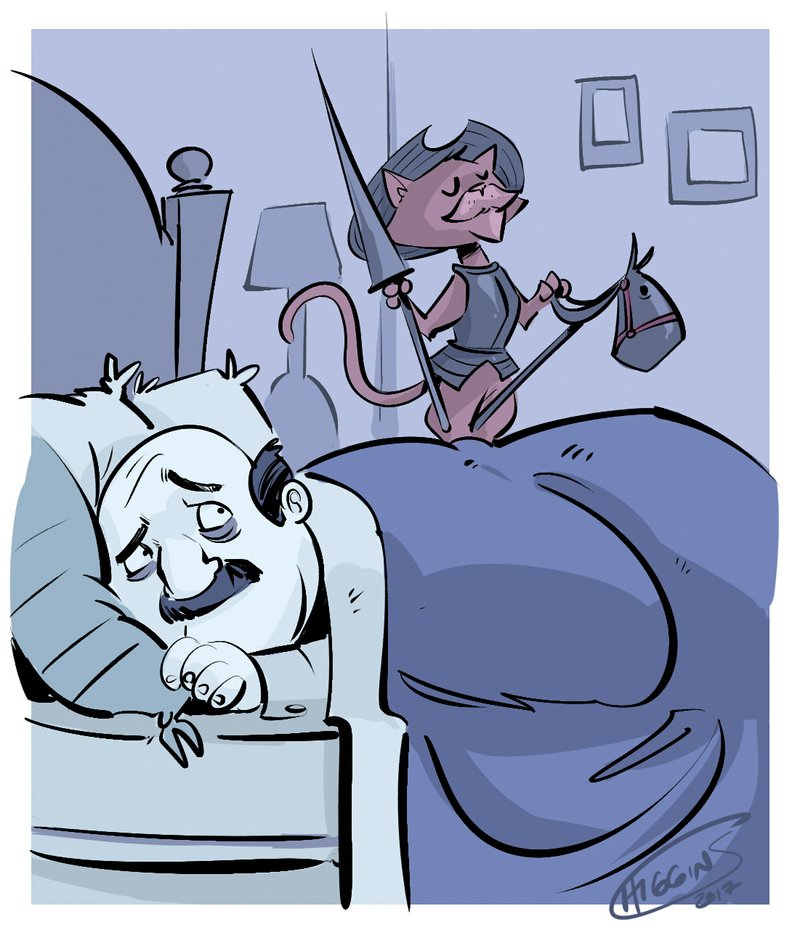Our cat, Claude, has started displaying odd behaviors. He wanders around the house at night and makes a lot of noise moaning and meowing. Sometimes he stands in the middle of our bedroom and yowls. He sounds so pitiful and it breaks my heart. I also think he's sleeping more than normal. Claude is 14 years old. Do cats get senile or have dementia? What are the signs?
Elderly cats can develop a feline version of Alzheimer's disease that's called Feline Cognitive Dysfunction, which typically affects cats older than 11 or 12 years. Among the signs is the eerie middle-of-the-night vocalizing that you've described.
The Cornell Feline Health Center in Ithaca, N.Y., lists other changes in behavior that can mean an older cat has dementia:
• Lack of interest in playing
• Decreased interest in food and water
• Using the bathroom outside of the litter box
• Altered sleep patterns
• Appearing disoriented or lost
• Nighttime wandering
Petmd.com notes additional signs of feline cognitive dysfunction: irritability, excessive licking or total disinterest in self-grooming, anxiety and restlessness, confusion and a disregard for rules of the house that the cat previously followed.
There are many similarities between Alzheimer's disease in humans and dementia in pets, veterinary behaviorist Nicholas Dodman says in his book Pets on the Couch: Neurotic Dogs, Compulsive Cats, Anxious Birds, and the New Science of Animal Psychiatry ($26, Atria Books). He explains that dementia "robs the afflicted of their memories and leaves them an empty shell of what they used to be." Dodson also says animals and humans both undergo pathological changes in the brain, such as a buildup of proteins that create "senile plaque" that decreases brain size.
When discussing possible treatments for pets with dementia, Dodman mentions that a drug used for treating Alzheimer's in people might be helpful for cats with feline cognitive dysfunction.
Namenda, which has the generic name of memantine, typically is used to treat obsessive-compulsive disorders in animals and people by regulating the neurotransmitter glutamate. Modulating an overactive glutamate system might help slow the progression of "cognitive deterioration" that causes dementia, Dodman says.
Getting back to the signs of cognitive dysfunction, some of them could be symptoms of other diseases or conditions, so you should take Claude to a veterinarian for an evaluation instead of simply accepting the idea that he has dementia. When dealing with elderly animals, Cornell's Feline Health Center notes that there's a tendency among pet owners to dismiss changes in behavior as normal signs of aging. That's not always the case.
Some behavior might be the result of a physical condition such as arthritis. The pain and stiffness resulting from joint inflammation may cause a pet to slow down or to cry out when touched. Arthritis also can make it harder for a cat to get in and out of his litter box, which could explain why he eliminates beside the box. Kidney disease or failure also could explain why a cat isn't using his litter box or is perhaps using it more often than in the past.
Cats with hyperthyroidism (overactive thyroid) or hypertension (high blood pressure) have a tendency to meow and cry loudly during the night. A cat that avoids his food might have dental disease or a gum infection. Signs of cognitive dysfunction also might be traced to a neurological problem such as a brain tumor or tissue inflammation.
A veterinarian can examine a cat to rule out causes other than dementia before making that diagnosis. If the problem is cognitive dysfunction, the Feline Health Center says the vet can prescribe an anti-anxiety medication for the cat. That might help with the yowling and night wandering.
Changes in the household can make things easier on a cat with dementia. For example, you could place additional litter boxes throughout the house so that he doesn't have to go very far to find one. Also make sure he has a refuge, a safe place where he can retreat and rest in peace and quiet.
Family on 03/22/2017
